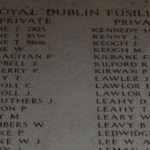Unequal, even in death
Death has been described as the great leveller, the one thing that ensures equality between human beings. Of course, it is no such thing, even in death some people are more equal than others. Standing, yesterday, among those gathered at the village of Guillemont for a ceremony to mark the anniversary of the first day of the battle of the Somme. The moving words of Tom Kettle were read. In his thirty-six years, Kettle managed to be a barrister, a member of parliament, an academic, a journalist and a soldier. The poem he wrote days before his death in September 1916 is among the most beautiful of all war poems:
To My Daughter Betty, The Gift of God
In wiser days, my darling rosebud, blown
To beauty proud as was your mother’s prime,
In that desired, delayed, incredible time,
You’ll ask why I abandoned you, my own,
And the dear heart that was your baby throne,
To dice with death. And oh! they’ll give you rhyme
And reason: some will call the thing sublime,
And some decry it in a knowing tone.
So here, while the mad guns curse overhead,
And tired men sigh with mud for couch and floor,
Know that we fools, now with the foolish dead,
Died not for flag, nor King, nor Emperor,—
But for a dream, born in a herdsman’s shed,
And for the secret Scripture of the poor.
Tomorrow we visit the grave of Francis Ledwidge, the peasant poet from Co Meath commemorated in Seamus Heaney’s “In Memoriam F E Ledwidge”, who died on 31st July 1917. Ledwidge’s poem”Soliloquy” seems almost a protest that there was equality, that death was indeed a great leveller:
It is too late now to retrieve
a fallen dream, too late to grieve
a name unmade, but not too late
to thank the gods for what is great:
a keen-edged sword, a soldier’s heart
is greater than a poet’s art.
and greater than a poet’s fame
a little grave that has no name.
But standing at the Menin Gate at Ypres this evening among the crowd for the nightly ceremony there came the memory that among the names of the fallen from the Royal Dublin Fusiliers there is the name of F. Ledwidge, except this is not Francis Ledwidge. He was in the Inniskillings and, although recorded as “blown to bits” by the chaplain, there was enough of him found to give him a grave. This initial and surname is the commemoration of Frank Ledwidge, son of Frank and Ellen Ledwidge, of 134 Thomas Street, Dublin. A Private in the Second Battalion of the Royal Dublin Fusiliers he died on 24th May 1915, he was seventeen years old.
If death really were the great leveller, Frank would be remembered along with Francis and Tom.


Comments
Unequal, even in death — No Comments
HTML tags allowed in your comment: <a href="" title=""> <abbr title=""> <acronym title=""> <b> <blockquote cite=""> <cite> <code> <del datetime=""> <em> <i> <q cite=""> <s> <strike> <strong>